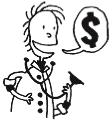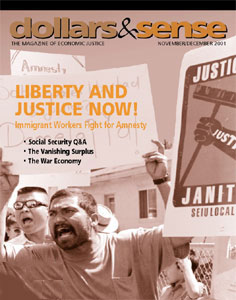
Dear Dr. Dollar:
I'm a new subscriber and wondering if you had any reading-list recommendations. Could you suggest five to ten must-read books, primers through advanced, that put forth a critique of reigning macro-economic conditions, and a reasoned, detailed framework of a political economy that you would endorse? Putting together my winter reading agenda…
Thank you for your time.
—Jeffrey, Detroit.
This article is from the November/December 2001 issue of Dollars and Sense: The Magazine of Economic Justice available at http://www.dollarsandsense.org

This article is from the November/December 2001 issue of Dollars & Sense magazine.
Thanks for asking, Jeffrey—here are some of our favorites.
Ten Must-Read Economics Books
Randy Albelda, Robert W. Drago, and Steven Shulman, Unlevel Playing Fields: Understanding Wage Inequality and Discrimination (Economic Affairs Bureau, Inc., 2001) Largely free of jargon (technical terms are clearly defined), this book provides a readable, informative, and at times entertaining overview of the economics of race, class, and gender. Albelda, Drago, and Shulman show how the “neoclassical” and “political economy” models—the right and left wings, respectively, of the economics debate—each explain inequality and discrimination in the labor market. Ideal for the non-economist who wants to understand why some economists point to structural obstacles that stand in individuals’ way, while others blame the individuals themselves. —TJF
Ron Baiman, Heather Boushey, and Dawn Saunders, eds., Political Economy and Contemporary Capitalism: Radical Perspectives on Economy, Theory, and Policy (M.E. Sharpe, Inc., 2001) Since the 1970s, the Union of Radical Political Economists (URPE) has periodically published readers summarizing the state of the capitalist economy. Behind the academic-sounding title of the latest installment, URPE’s critical edge is as sharp as ever. Baiman, Boushey, and Saunders’s volume covers a wide range of topics, from poverty to globalization. The chapter authors make up a dream team of left U.S. political economists, including a number of Dollars & Sense stalwarts. —CT
Herman Daly and John Cobb, For the Common Good (Beacon Press, 1994) Daly and Cobb offer a vision of community-rooted economics, taking the ecological limitations on Earth-bound human activity very seriously. Along the way, the authors provide a scathing critique of mainstream economics; dismantle contemporary “free-trade” ideology, emphasizing how increased capital mobility calls into question the older models of “comparative advantage”; and call for land to be re-envisioned as a “trust,” instead of a commodity. An excellent introduction to environmental economics. —TW
Susan Fainstein and Scott Campbell, eds., Readings in Urban Theory (Blackwell Publishers, 1996) How to think about the local and the global together—this vexing problem was the foundation of a school of urban sociology emerging in the 1970s. Readings in Urban Theory collects seminal essays from some of its most important contributors, like Saskia Sassen and Manuel Castells. The volume is a great introduction to the kind of political economy that keeps its eye on the messy racial, spatial, and policy dynamics that shape economic conflicts, and are shaped by them. —AS
Nancy Folbre, The Invisible Heart: Economics and Family Values (The New Press, 2001) In this masterpiece of feminist political economy, Nancy Folbre pulls together her conclusions from 20 years’ work on the economics of families—all in a lively style that combines first-person narrative with economic and policy analysis. In the past, Folbre argues, the work of caring for families was guaranteed by patriarchal rules that made women responsible for unpaid household labor. But now, markets are drawing women into paid work and undermining the old patriarchal system. Where will the caring work come from? A hint: it won’t be from the market. —CT
Juan González, Harvest of Empire: “A History of Latinos in America” (Penguin USA, 2001) A sweeping synthesis of the different ways the British and Spanish empires shaped race and economy in the “New World.” It is a lively and penetrating antidote to economists for whom “race” is often a shorthand for class. González helped found the Young Lords party in the 1960s. Now a columnist for the New York Daily News, he always manages to see real people acting to shape the flow of history. —AS
Arthur MacEwan, Neo-Liberalism or Democracy? Economic Strategy, Markets, and Alternatives for the 21st Century (Zed Books, Ltd., 2000) Margaret Thatcher famously declared that “there is no alternative” to bare-knuckle capitalism. In this book, Dr. Dollar himself tackles political economy on a large canvas, and concludes that there is a democratic alternative. Drawing on a broad knowledge of economies rich and poor, North and South, MacEwan discusses in depth what democratic development could look like. Read it yourself, then give it to your in-laws who can’t understand why you keep complaining about capitalism. —CT
Manning Marable, How Capitalism Underdeveloped Black America (South End Press, 1999) If you didn’t read Marable’s classic when it first came out in 1983, read it now. If you read it then, maybe it’s time to read it again. Marable’s analysis of the various institutions and class divisions of African-American society rings as true today as it did nearly 20 years ago. In fact, some chapters, such as his discussion of blacks in prison, have proven prescient in ways most of us did not suspect back then. Marable’s style—which he describes as “polemical”—makes for a compelling read. —CT
Karl Marx, Wage-Labor and Capital and Value, Price and Profit (International Publishers, 1997) Two of the best short expositions of Marx’s economics, written by Marx himself. Wage-Labor and Capital (1849) was one of Marx’s first attempts to explain the antagonism between worker and capitalist. Frederick Engels’ 1891 revision turned it into a fine summary of his friend’s mature economic thought. Published just before Capital, Vol. 1, Value, Price and Profit (1865) summarizes much of the analysis in Marx’s dense masterpiece. The short book is, to borrow from Edward Aveling’s 1898 preface, “an explanation by Marx of our explanations of him.” —AR
William K. Tabb, The Amoral Elephant: Globalization and the Struggle for Social Justice in the Twenty-First Century (Monthly Review Press, 2001) Bill Tabb, a Queens College professor associated with Monthly Review magazine, is an old hand at political economy. But he never forgets that he is writing for noneconomists. Chapters in his latest book include: “Globalization and the Imperialism of Finance”; “Miracles and Crises in the Southeast Asian Economies”; and “Progressive Globalism: Challenging the Audacity of Capital.” —AS
(Reviews by Tami J. Friedman, Alejandro Reuss, Abby Scher, Chris Tilly, and Thad Williamson)
Honorable Mentions
Mike Davis, Prisoners of the American Dream: Politics and Economy in the History of the U.S. Working Class (W.W. Norton & Company, Inc., 2000) Serious lessons from both the victories and defeats of U.S. workers’ movements.
Jean Dreze and Amartya Sen, Hunger and Public Action (Oxford University Press, 1991) How economic and political institutions cause hunger—and how public action can prevent it.
John Kenneth Galbraith, The Affluent Society (Houghton Mifflin Company, 1998) A classic indictment of “private wealth” and “public squalor” in American life.
Eduardo Galeano, Open Veins of Latin America: Five Centuries of the Pillage of a Continent (Monthly Review Press, 1997) The colonial plunder of the region from Columbus to the present.
Robert Heilbroner, The Worldly Philosophers: The Lives, Times and Ideas of the Great Economic Thinkers (Simon & Schuster Trade Paperbacks, 1999) A great introduction to the “dead white men” of economics—Smith, Malthus, Ricardo, Marx, Veblen, Keynes, and Schumpeter.
Arlie Russell Hochschild, The Time Bind: When Work Becomes Home and Home Becomes Work (Henry Holt & Company, Inc., 2000) The attraction of the workplace when home becomes harried and increasingly modeled on the utilitarian culture of work.
Lawrence Lessig, Code and Other Laws of Cyberspace (Basic Books, 2000) An excellent antidote to the libertarian free-market clap-trap about information technology.
Joan Robinson, An Essay on Marxian Economics (Porcupine Press, Inc., 1991) A bold critique of Marx, and a defense of his “nightmare” vision over mainstream economics’ “gentle complacency.”
Juliet Schor, The Overworked American: The Unexpected Decline of Leisure (Basic Books, 1993); The Overspent American: Why We Want What We Don’t Need (HarperCollins Publishers, Inc., 1999) The U.S. afflictions of working hard and shopping hard, from an outstanding political economist of work and leisure.
David Schweickart, Against Capitalism (Westview Press, 1996) Not only an ethical critique of capitalism, but also one of the most convincing current proposals for a democratic socialist economy.
Bob Sutcliffe, 100 Ways of Seeing an Unequal World (Zed Books, Ltd., 2001) An enlightening view of the inequalities that plague the world economy, laid out in innovative and clear graphics.
Paul Sweezy and Paul Baran, Monopoly Capital: An Essay on the American Economic and Social Order (Monthly Review Press, 1990) A classic application of Marxist economic concepts to the twentieth-century U.S. economy.
Studs Terkel, Working: People Talk about What They Do All Day and how They Feel about What They Do (W.W. Norton & Company, Inc., 1997) A masterpiece of oral history, and a genuine poetry of alienation, pride, and struggle.
Immanuel Wallerstein, Utopistics: Or, Historical Choices of the Twenty-First Century (The New Press, 1998) A short and readable “big picture” look at the world political-economic system, and a call for more visionary thinking about a better, more humane world.
